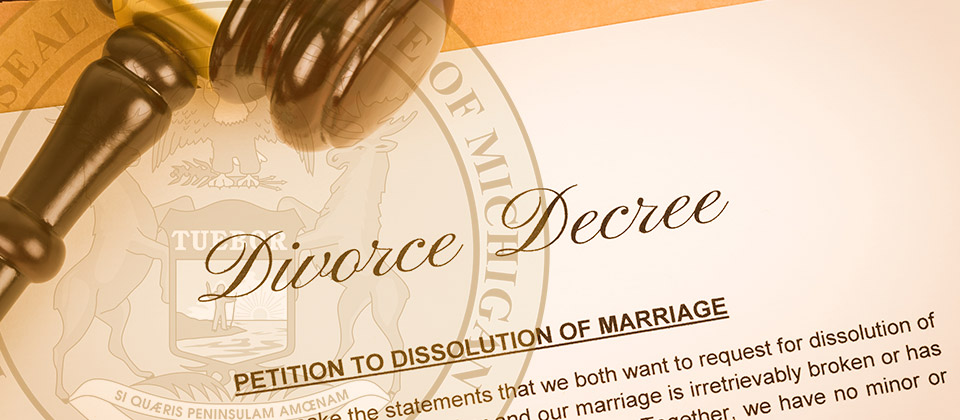Guide to Michigan Divorce Records

Following even the most amicable of divorces, one spouse may want to revisit alimony payments or child support down the line. These situations demand context for why each party agreed to specific terms and how that agreement translates into your current situation. Revisiting these situations requires an in-depth review of the original Michigan divorce record, including any substantiating financial documents.
It's highly recommended that you always keep at least one copy of your divorce records on hand. This will let you skip the long processing times and handle any problems that could arise from the lack of documentation or proof of your divorce.
What are Michigan Divorce Records?
Michigan divorce records are a collection of documents covering various aspects of the divorce. They include the initial divorce filing, grounds for divorce, court transcripts, and many other details from both negotiations and the courtroom.
While these records are pretty thorough, one section is more important than the rest: the final judgment. In most cases, this is used to prove that a divorce is legally over and outlines terms for most of the case's contested topics like Alimony.
Certified divorce records feature a raised seal unique to the state. Both are obtainable through the Michigan Department of Health & Human Services (MDHHS) and the county courts that finalized the divorce. However, the MDDHS only maintains records from 1897 to the present. So, if you're searching for divorce records pertaining to genealogical research, you'll need to contact the state archives instead.
What's Inside the Divorce Record?

Similar to the intricate nature of the divorce process, divorce records can contain a wide variety of information. Included documents can range from absurd decisions about who keeps a pet fish to serious discussions over medical decision-making. Despite the endless stipulations that can be added, most divorce records are separated into the following sections:
- Final Judgment - Once signed by the judge, this document denotes the legal end of the marriage. It also marks the beginning of their new responsibilities toward each other and their children.
- Affidavit - It is a requirement in Family Courts for both spouses to submit a summary of their financial conditions. The details cover financial accounts, life insurance policies, tax data, and outstanding debts.
- Spousal Support – Also referred to as Alimony, spousal support in Michigan can be permanent or temporary. Permanent terms are typically reserved for long-term marriages or when one spouse has made significant sacrifices for the marriage.
- Child Custody - This section outlines the children's living situations, visitation privileges, and financial support payments. The courts strive to maintain normalcy and a standard of living for the children and minimize the effects of the divorce.
- Division of Assets and Debt - Michigan is a "marital property state". This means that jointly owned property is usually equally divided while the current holder keeps separately owned property.
Errors in Divorce Records
Dozens of complex matters are discussed throughout a divorce, and the spouses are under a great deal of stress. Under these conditions, it's expected that a few mistakes will occur. Attorneys and accountants usually catch these mistakes, but not always.
The most significant mistakes often happen during the Affidavit. One spouse forgets about an important asset and leads the judge to make a verdict based on incomplete information. This situation leads to incorrectly calculated Alimony, property division, and custody rights.
Fixing errors in a divorce record in Michigan is done in two ways: filing an appeal or requesting a modification.
There's only a 21-day window after the final judgment is signed to submit an appeal to the court. So, if you don't catch the mistake in time, you lose the chance.
Judgment modifications can be as simple or complex as the relationship with your ex. If both sides agree on the error, they can collaborate and submit the revision to the courts. However, contentious divorces will likely find themselves back in court.
Divorce Statistics in the State

Analyzing divorce statistics helps states create laws and programs that support the family structure. If a state experiences a surge in divorces, it may indicate an emerging societal issue. Each state faces unique challenges, and policymakers must know when to make changes.
Divorce Rate
Michigan has a divorce rate of 2.3 per thousand citizens. This makes it the 12th lowest divorcing state in the country despite being only slightly below the national average of 2.6.
Divorces by Age Group
Psychology Today found that couples under 25 and over 35 are the most likely to divorce. Michigan's divorce rates go against those trends by having highly successful early marriages.
According to Michigan vital statistics, ages 20-24 had the lowest divorce rate, with massive increases in each age group above that. This gives Michigan an above-average divorce age of 44 for men and 41 for women.
Median Duration of Marriages
The average length of an American marriage ending in divorce is roughly eight years. Michigan considerably beats this statistic with an average first marriage duration of 10 years and 7 months.
Predictably, the median length of Michigan marriages declines based on the participant's previous number of marriages. By the second marriage, men and women divorce around seven years into the union.
How to Find Michigan Divorce Records

Michigan is one of the few states where its Vital Records Division can distribute certified copies of divorce decrees. Their library carries files dating back to 1897 and offers multiple options for ordering both online and offline.
All of them have similar requirements and fill out the same form. You must pay a fee and provide enough information for a representative to locate the files in their database. Have the following details ready:
- Parties' full names during marriage
- Date of divorce
- Case number
The form you'll use is the "Application For a Certified Copy – Michigan Divorce Record".
Order by Mail
Mail orders are reasonably simple but have a lengthy processing time of 4-5 weeks. This estimate doesn't consider shipping times or payment processing through their accounting department. The wait time can be reduced to 2-3 weeks with the Expedited "Rush" option for an additional fee.
All you have to do is fill out the form linked above and send it in with a money order or check for the exact amount. You cannot pay with cash over the mail, and payment should be made to the "State of Michigan".
Regular Mail Orders are sent to:Vital Records Requests
P.O. Box 30721
Lansing MI 48909Rush Mail Orders are sent to:
Vital Records RUSH
P.O. Box 30721
Lansing MI 48909
Order Online through VitalChek
VitalChek is a third-party certificate-requesting service that's partnered with many states. Its primary benefit is that it simplifies the ordering process and minimizes your risk of mistakes. You must have basic search information and a valid payment method to find the file.
The downside to VitalChek is the extra fees. VitalChek takes the standard fees the Vital Records Division charges and adds on its own. Ordering Michigan divorce decrees through this service can cost anywhere from $48 to $80.
For additional information, you can call 866-443-9897.
Order in Person
Michigan's Vital Records Office is located at 333 S Grand Avenue, Lansing, MI 48933.
Their offices are available by appointment, and the only open slots are Tuesdays and Thursdays from 10 AM to 2 PM. These are limited and coveted slots and can be scheduled at most 21 days in advance.
We don't recommend going through the process entirely in person. If your request has a problem, you may wait an entire month for another appointment.
We recommend ordering through VitalChek's Will Call option if you urgently require your divorce certificate. Your order will be processed within 2-5 business days, and you can pick up your order in person rather than waiting in the mail.
For this option, applicants must bring a valid photo I.D. and email confirmation of their VitalChek order. Will Call hours are also Tuesdays and Thursdays from 10 AM to 2 PM.
Michigan Superior Court Contact Directory
While divorce decrees are available through the State Vital Records Division, complete divorce records are only found in the county that finalized the divorce. Each county has multiple court systems, but divorce records are held in the superior courts.
To save time, we've compiled the phone numbers for the top ten most populous Michigan counties.
| County | Superior Court |
|---|---|
| Wayne County | (313) 224-0157 |
| Oakland County | (248) 858-0344 |
| Macomb County | (586) 469-7171 |
| Kent County | (877) 543-2660 |
| Genessee County | (810) 257-3300 |
| Washtenaw County | (734) 222-3001 |
| Ottawa County | (616) 846-8280 |
| Ingham County | (517) 483-6500 |
| Kalamazoo County | (269) 383-8837 |
| Livingston County | (517) 546-0500 |
FAQ on Divorce Records in Michigan
What's the difference between a divorce record and a divorce decree?
A divorce decree is a document guaranteed by the state government that a marriage has legally ended. The overseeing judge signs it, and it can be used for various legal and governmental proceedings.
A divorce record is the compilation of all documents submitted during the divorce. It includes all the financial documents, evidence, and court transcripts created over the case. A divorce record isn't necessary as proof but is useful when reviewing the event as a whole.
Do I need my divorce records to remarry in Michigan?
You must have a certified divorce decree to apply for a new marriage license. Michigan has a mandatory 60-day waiting period to remarry after a divorce is finalized. This should be enough time to obtain your divorce records.
Do I have to pay a fee to get my divorce record in Michigan?
Ordering through VitalChek has the following cost breakdown:
- Search Fee - $34
- Processing Fee - $14
- Optional RUSH Fee (2-week processing) - $12
- Overnight Delivery Fee (1-3 business days) - $19.75
This is more expensive than ordering by mail, but it cuts the turnaround time by multiple weeks.
Requests directly through the Vital Records Office include the following fees:
- Search Fee - $34
- Additional Copies - $16/each
- RUSH Shipping - $12
Additionally, if you provide the incorrect year of the divorce filing and the office must search for additional years, there's a $12 fee per searched year.
Can anyone request a divorce record in Michigan?
There are no qualifying factors for requesting a certified divorce record in Michigan. It is not limited to the spouses or their families.
